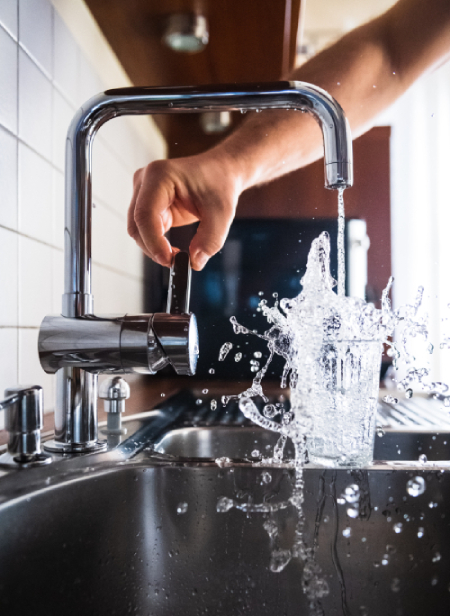
Water filters
There are numerous technologies and types of water filters out there, and among some, there are significant differences.
Our intention is not only to present and offer what we think is one of the best filtration systems, we would also like to provide useful information about water and filtering in general.
Below, you will find all the information you need in order to make a decision about which type suits your needs.
-
Sediment filters trap and remove solids and roughest particles from water, through a process called mechanical filtration. A good example of particles that are physically blocked from passing into filtered water is rust particles from aging pipes, dirt and debris. Such sediments are not only bad for our health but can also damage domestic appliances.
This is why whole house sediment filtration is recommended, not only for your drinking water but also to prevent clogs in plumbing and water pressure decrease. Big particles prevent filtration systems like RO and ultraviolet lights from operating efficiently - sediment filter is often set as the first filter in such systems and possibly also as a third filter.
Restaurants and bars often use sediment pre-filters to ensure the quality of their food and drinks. It can also be found in pool filters. If you live in an area where rainwater happens to bring silt, clay, and soil to your water supply, you should consider using at least sediment filter (you will know this is the case if your water occasionally turns yellow or brown).
Another reason to use sediment filters is if a private well is your water source. There are different types of sediment filters: pleated, melt-blown, string-wound, spin-down and bag filters. Sediment filters should be changed every 6 months to one year - observe your water pressure.
-
Solid carbon block filters first introduced in early 1970 still serve as one of the most effective and widely used technologies for drinking water treatment. They work as a standalone method or in connection to other filtration types.
-
Activated carbon filters also are known as pre-filters use active carbon or charcoal to remove particles such as sediments and chlorine by attracting and absorbing them from water. These filters also take care that the smell and taste of filtered water are improved.
Activated carbon is a form of carbon which has been developed to increase the porosity. A larger surface area is obtained in such a way, and this is important for the quality of filtration.
Upflow carbon filters are an easy, cost-effective way to remove chlorine from your water. They do not need electricity or drain connections. Different types of carbon filters are: carbon block filters, granular activated carbon (GAC), coconut shell charcoal filters...
-
Ceramic filters use a ceramic filter candle to remove bacteria and block pathogens. It works well in the prevention of waterborne diseases. It is one of the oldest filtration systems on the market (from the 19th century). They are still used in under-sink, countertop and gravity filters.
-
Gravity filtration is a method of filtering impurities by using gravity to push liquids through a filter. Such devices are composed of upper and lower chambers separated by different filters. Microscopic pores of these filters prevent contaminants and pathogens to pass through and the lower chamber gets filled with clean water.
Such filters are very convenient because they do not require plumbing or electricity. A disadvantage is that the upper chamber needs to be filled with water manually and they process the water relatively slow. For bigger households, they cannot filter enough water for one day. Interestingly, their use can be traced back to the year 1800 in London.
-
Alkaline/Water Ionizers use a process known as electrolysis. Water passes through electrically charged plates and much softer water which is lower in acidity comes out as a result. Such machines originally became popular in Japan and Eastern Asia. Japanese people are well-known for their water therapies, so no wonder that also alkaline water originates from there.
-
UV filters are the newest technology on the market. Here, ultraviolet radiation is used to treat water.
-
Infrared filters use heat and light to negatively charge the water. They are used in hard water areas where water softening is desired.
